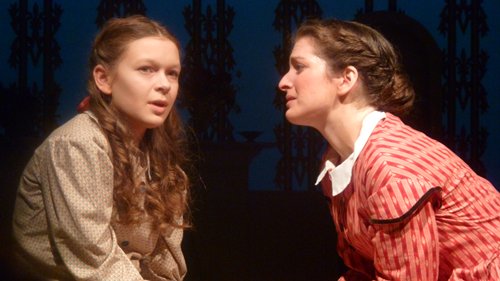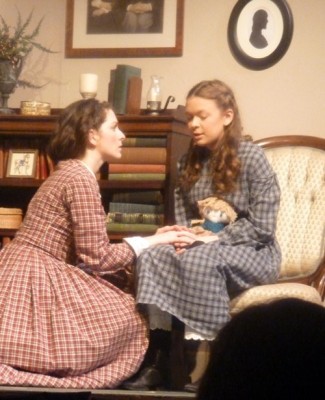 L to R, Beth, played by Amelie Lasker and Jo, played by Nicole Dunn for the Concord Players’ production of Little Women
L to R, Beth, played by Amelie Lasker and Jo, played by Nicole Dunn for the Concord Players’ production of Little Women
All my life I have had a passion for Louisa May Alcott. When I was ten my aunt gave me a children’s biography of Louisa which I still have, albeit worn out from reading. A children’s biography led to adult biographies which then led to frequent visits to nearby Concord, MA and Orchard House, the home of the Alcott family.
In this home, Louisa wrote her classic, Little Women.
How many times have you read Little Women? How many of you have aspired to be Jo March? She was the independent tomboy with the big temper and equally generous heart who inspired many a writer, reformer and political leader.
 L to R, Jo, played by Nicole Dunn and Beth, played by Amelie Lasker for the Concord Players’ production of Little Women.
L to R, Jo, played by Nicole Dunn and Beth, played by Amelie Lasker for the Concord Players’ production of Little Women.
While I have Jo’s creative urges (and the temper too), the one I aspire to be is Beth. Sweet, gentle, shy Beth. Hardly a girl who would make any kind of impact in the world. Seen by many as passive, even weak, her tragic death is how she is remembered.
I think Beth gets a bad rap. Since she is so shy, docile and self-sacrificing, critics think she is a poor example for modern women. In an essay in the Norton Critical Edition of Little Women entitled “The Horror of Little Women,” Angela M. Estes and Kathleen Margaret Lant theorize that Beth was, in essence, the Perfect Nineteenth Century Woman: “Beth, who has not even sufficient self-reliant impulses to stay alive, becomes for Jo – and by extension for Alcott – the example of what all women are required by custom to be, the completely perfect woman – passive, acquiescent, dead.”
The critics, however, are missing the point. It’s true that Jo is admired because she wants to stand on her own without benefit of the safe haven of her family or the security of marriage. Autonomy for a nineteenth-century woman was considered radical.
Beth, however, was radical too. Her brand of self-sacrificial love empowered her just as a fiery independent spirit empowered Jo. Beth also left the safety of home to reach out to an impoverished family, and at considerable risk to her own well being.
The scene is played out in chapter seventeen of Little Women, “Little Faithful.” Beth began by reminding her sisters of Marmee’s request to look after the Hummels, a desperately poor family of German immigrants. Everyone had an excuse: Meg was “too tired,” Jo was wrapped up in her writing, Amy wasn’t home. Beth was afraid to go because Mrs. Hummel’s baby was getting sicker by the day and Beth didn’t know how to care for it.
In the end, her perfect love gave her the courage to go. Over the course of a week she visited the Hummels each day as the situation grew more and more dire.
Her one fault was that she was not assertive enough in taking care of herself. She obviously wasn’t feeling well when she asked Meg and Jo to help, but she never mentioned it to them. Ultimately she was to pay a great price for not taking care of her own needs.
The critics are quick to comment on Beth’s self-forgetfulness but they fail to recognize her extraordinary courage. As the baby was dying, Beth took it into her lap and tried to comfort it. Even when it died, she would not relinquish it until its mother came back with the doctor. She even stayed to grieve with the family.
Love is the only explanation for Beth’s show of courage. Her compassion for the child superseded her fear. She did not fear death and was willing to cradle the dead baby. Her love was that perfect.
Beth was self-giving to the point of sacrificing herself. The baby died of scarlet fever and Beth caught the fever, eventually dying of it herself later in the book.
Perhaps some balance was needed and this is why she gets the bad rap. But Beth was far more than a “shadow sister” who was too shy to talk to boys or strike out on her own. Her strength and courage emulated Jesus, who sacrificed Himself for all people. In the Bible, 1 John 14:18 says, “There is no fear in love; but perfect love casts out fear . . .”
We know that Jo aligned herself with Beth because she saw in her sister qualities she needed to develop within herself. Some might say that these qualities were not desirable because they were signs of weakness. But Jo, a strong and assertive girl, sensed that she needed balance in her life too – balance that Beth could help provide by her example. It’s just unfortunate that Beth could not learn by Jo’s example as well. Polar opposites, they were attracted to each other, learning from each other, feeding each other.
Beth may have exemplified the Perfect Woman of the nineteenth century but she had many admirable qualities and should not be so easily dismissed. Strength comes in many forms.
I only hope that someday I can demonstrate those qualities too.
Susan maintains the only blog devoted to Louisa May Alcott: her life, works and legacy. You can read more about Louisa May Alcott at louisamayalcottismypassion.com.
About the Author

Susan Bailey
Susan Bailey is the author of River of Grace: Creative Passages Through Difficult Times (Ave Maria Press), and Louisa May Alcott: Illuminated by The Message (ACTA Publications), part of their Literary Portals to Prayer series. Along with her blogs Be as One and Louisa May Alcott is My Passion, Susan writes for the Diocese of Worcester newspaper, The Catholic Free Press.


.png?width=1806&height=731&name=CatholicMom_hcfm_logo1_pos_871c_2728c%20(002).png)
Comments